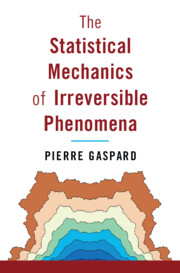Book contents
- Frontmatter
- Dedication
- Contents
- Preface
- 1 Thermodynamics
- 2 Statistical Mechanics
- 3 Hydrodynamics
- 4 Stochastic Processes
- 5 Fluctuation Relations for Energy and Particle Fluxes
- 6 Path Probabilities, Temporal Disorder, and Irreversibility
- 7 Driven Brownian Particles and Related Systems
- 8 Effusion Processes
- 9 Processes in Dilute and Rarefied Gases
- 10 Fluctuating Chemohydrodynamics
- 11 Reactions
- 12 Active Processes
- 13 Transport in Hamiltonian Dynamical Models
- 14 Quantum Statistical Mechanics
- 15 Transport in Open Quantum Systems
- Appendix A Complements on Thermodynamics
- Appendix B Complements on Dynamical Systems Theory
- Appendix C Complements on Statistical Mechanics
- Appendix D Complements on Hydrodynamics
- Appendix E Complements on Stochastic Processes
- Appendix F Complements on Fluctuation Relations
- References
- Index
12 - Active Processes
Published online by Cambridge University Press: 14 July 2022
- Frontmatter
- Dedication
- Contents
- Preface
- 1 Thermodynamics
- 2 Statistical Mechanics
- 3 Hydrodynamics
- 4 Stochastic Processes
- 5 Fluctuation Relations for Energy and Particle Fluxes
- 6 Path Probabilities, Temporal Disorder, and Irreversibility
- 7 Driven Brownian Particles and Related Systems
- 8 Effusion Processes
- 9 Processes in Dilute and Rarefied Gases
- 10 Fluctuating Chemohydrodynamics
- 11 Reactions
- 12 Active Processes
- 13 Transport in Hamiltonian Dynamical Models
- 14 Quantum Statistical Mechanics
- 15 Transport in Open Quantum Systems
- Appendix A Complements on Thermodynamics
- Appendix B Complements on Dynamical Systems Theory
- Appendix C Complements on Statistical Mechanics
- Appendix D Complements on Hydrodynamics
- Appendix E Complements on Stochastic Processes
- Appendix F Complements on Fluctuation Relations
- References
- Index
Summary
Active nonequilibrium processes are characterized by the coupling of an ionic current or a mechanical motion to a chemical reaction. This coupling induces energy transduction, satisfying Onsager reciprocal relations in the linear regime close to equilibrium and the bivariate fluctuation relation in regimes farther away from equilibrium. These considerations concern, in particular, molecular motors as well as active colloidal particles that are self-propelled by chemical reactions catalyzed at their surface and diffusiophoresis. These active processes can be described by stochastic processes obeying bivariate fluctuation relations for the coupled currents. The mechanochemical coupling can be characterized in terms of the linear and nonlinear response coefficients, as well as the efficiencies defined in the different regimes of energy transduction, i.e., propulsion by the chemical reaction on the one hand, and the synthesis of fuel from products on the other hand.
Keywords
- Type
- Chapter
- Information
- The Statistical Mechanics of Irreversible Phenomena , pp. 438 - 468Publisher: Cambridge University PressPrint publication year: 2022

